Doctor calls for investigation into covid vaccines effect on the menstrual cycle
A medical expert has called for an investigation into the vaccine's effect on the menstrual cycle after 30,000 reported menstrual changes


A doctor has released an article in the British Medical Journal that has explored the increased number of people reporting changes in their menstrual cycle after receiving the COVID-19 vaccine.
During the pandemic, many questions have been raised about the Covid vaccines link to pregnancy, fertility and periods. Although fertility rumours have been dispelled by medical specialists, many women have experienced the COVID-19 vaccine's effect on their menstrual cycle.
A recent article from a British doctor has called for an investigation into these claims by women whose menstruation has been affected by the vaccine.
Dr. Victoria Male, from Imperial College London, highlighted in an article for the British Medical Journal, that 30,000 women in the UK have noted a change in the menstrual cycle following their vaccination.
Dr. Male highlighted that this menstrual cycle change was likely due to the body's immune response and not something in the COVID-19 vaccines. However, the doctor suggested that the links between the vaccine and menstruation should be investigated by medical researchers.
Dr. Male said that the UK’s Medicines and Healthcare Products Regulatory Agency (MHRA) lists many side effects of the vaccine including a sore arm, fever, fatigue, and myalgia, but does not reference menstrual changes that many women experience.
“Changes to periods and unexpected vaginal bleeding are not listed, but primary care clinicians and those working in reproductive health are increasingly approached by people who have experienced these events shortly after vaccination,” said Dr. Male
Sign up to our free daily email for the latest royal and entertainment news, interesting opinion, expert advice on styling and beauty trends, and no-nonsense guides to the health and wellness questions you want answered.
“More than 30 000 reports of these events had been made to MHRA’s yellow card surveillance scheme for adverse drug reactions by 2 September 2021, across all COVID-19 vaccines currently offered.”
Dr. Male stressed that despite many women reporting menstrual changes, the effect on fertility for women was unchanged.
“Most people who report a change to their period after vaccination find that it returns to normal the following cycle and, importantly, there is no evidence that COVID-19 vaccination adversely affects fertility.”
She elaborated on research into fertility rates and explained, “In clinical trials, unintended pregnancies occurred at similar rates in vaccinated and unvaccinated groups. In assisted reproduction clinics, fertility measures and pregnancy rates are similar in vaccinated and unvaccinated patients.”

Although fertility rates were unaffected by the vaccine, the doctor still called for an investigation into the changes that people have reported in their menstrual cycle.
“Although reported changes to the menstrual cycle after vaccination are short-lived, robust research into this possible adverse reaction remains critical to the overall success of the vaccination programme.”
The doctor warned that many women are reluctant to receive that vaccine because of the misinformation about the link between the vaccine and fertility.
“Vaccine hesitancy among young women is largely driven by false claims that COVID-19 vaccines could harm their chances of future pregnancy. Failing to thoroughly investigate reports of menstrual changes after vaccination is likely to fuel these fears,” she said.
She added that investigating a potential link will not only dispel rumors but also help women who want to achieve or avoid pregnancy.
“If a link between vaccination and menstrual changes is confirmed, this information will allow people to plan for potentially altered cycles,” she said.
Dr. Male concluded that for future vaccines, women’s menstrual health should be a forefront concern that is investigated by a research team and is not an “ afterthought,” that is considered only after concerns have been raised by worried women.
Laura is the Entertainment Editor for woman&home who primarily covers television, film, and celebrity news. Laura loves drinking and eating and can often be found trying to get reservations at London's trendiest restaurants. When she's not wining and dining, Laura can also be found travelling, baking, and hiking with her dog.
